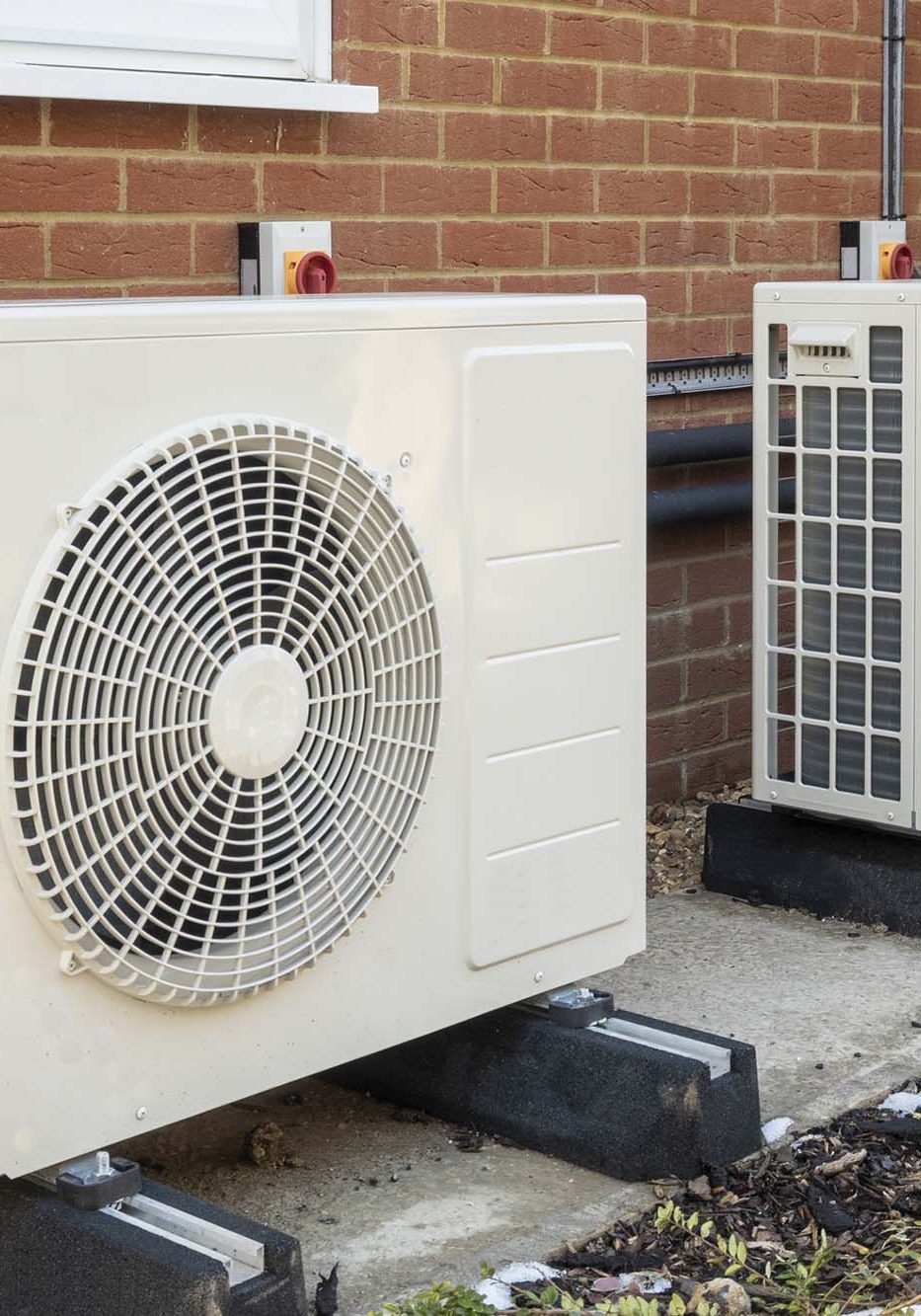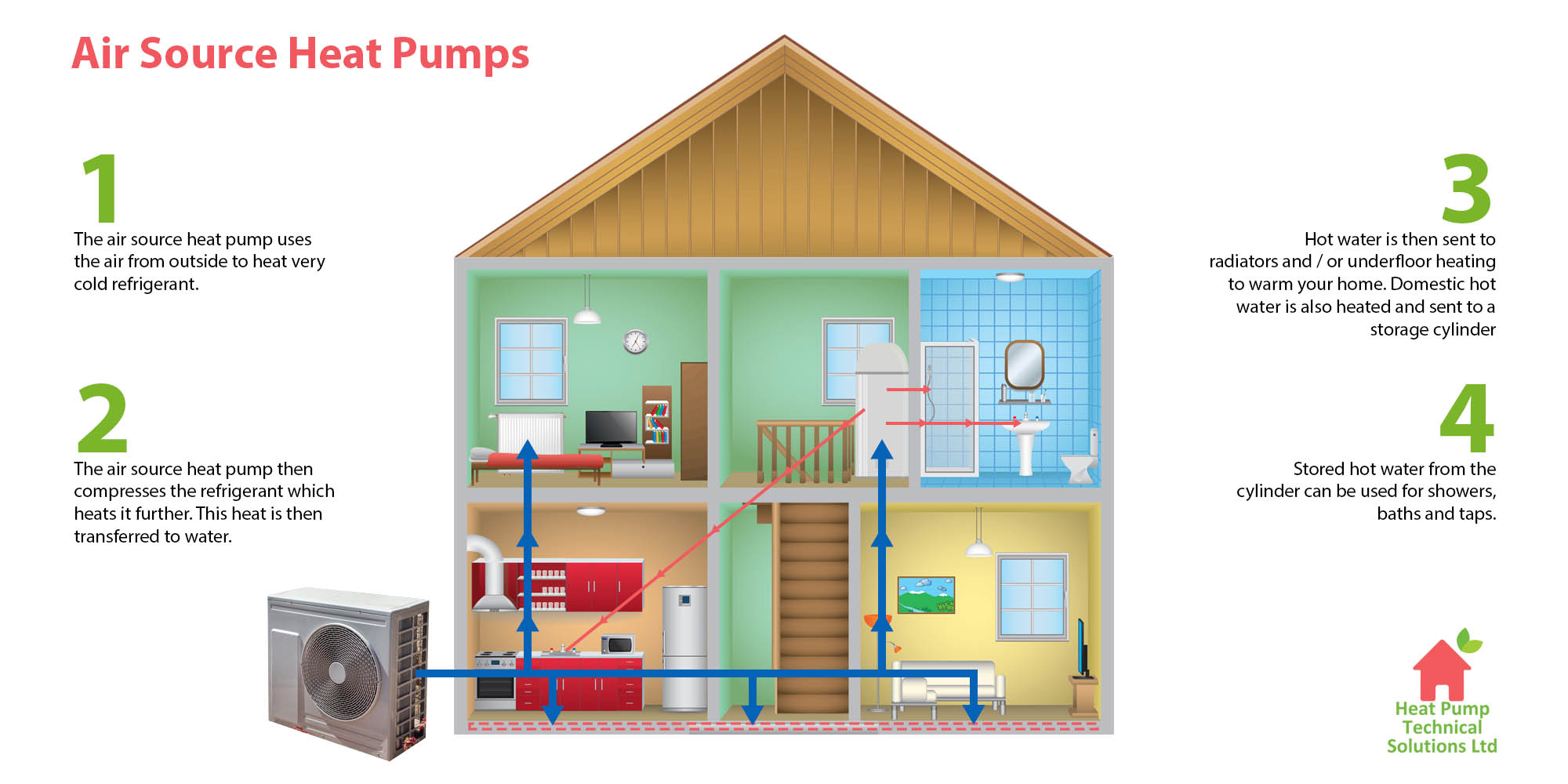All About Heat Pumps
What is a heat pump?
Heat pumps utilise heat from outside and move it inside. Although it uses electricity to do this, the amount of heat delivered is greater than the amount of electricity used to power the system. Heat pumps capture heat that is already available in the environment and uses that to heat your heating and hot water. The use of this technology can save you money on your energy bills and reduce your impact on the environment.
How do heat pumps work?
Step-By-Step Guide On How Heat Pumps Operate
Air from the exterior is blown into your heat pump device, circulating across a network of tubes filled with refrigerant.
By warming the working fluid, the air turns the refrigerant from a liquid into a gas.
This newly-formed gas is then passed through a compressor, which increases the pressure and adds more heat to the substance.
These compressed, hot gases then transfer into a heat exchanger surrounded by cool air or water.
Warm air or water is then formed from the heat of the compressed refrigerant.
Your home is provided with heating and hot water thanks to the circulation of warm air and water.
Following the completion of this cycle, the refrigerant is condensed back into its former cool, liquid form and the process starts from the beginning.


Is an air source heat pump right for me?
At Heat Pump Technical Solutions we firmly believe all installers should be honest with customers from the start. We will ensure we collect enough information from you at every stage to ensure we can advise you of the best air source heat pump solution. Our advice could also be that a air source heat pump is not the solution for you.
Heat pumps are suitable for most, and have been installed already in thousands of UK homes and businesses and millions more around the world. Across Europe over 14 million homes use heat pumps for their heating and hot water.* Scandinavian countries have converted to heat pump technology quicker than other nations so this should reassure you that they also work well in cold climates.
The UK government is supporting the adoption of heat pump technology and there is a quick, easy to use heat pump check online tool here. This tool will give you guide as to whether air source heat pumps are right for your home.
*European heat pump market and statistics 2021
Is an air source heat pump right for me?
How much work is required to install the right air source heat pump solution for you very much depends on your current system and your needs moving forward.
**Space - You’ll need a place outside where a unit can be fitted to a wall or on the ground. It must have some space around it to allow good air flow.
**Air to Air, Air to Water, Hybrid system? The technology you choose will be dependent on what will work best for your property and your heating / hot water needs.
There are two types of air to water air source heat pumps: monobloc and split systems. A monobloc system has all the components in a single outdoor unit, with pipes carrying water to the central heating system and a hot water cylinder inside. A split system separates the components between indoor and outdoor units. Whether a monobloc or split system is right for you will depend on your budget and the space available.
Monobloc systems tend to be cheaper and quicker to install and don’t take up as much space in your home, although they are generally slightly less efficient than split systems. The efficiency gain from split systems comes from some of the heat transfer taking place inside the building where it is warmer, resulting in less heat being lost. If you’re not limited by space inside your home, it may be worth the extra cost of installing a split system.
**Noise - The external unit for a heat pump is identical for both monobloc and split heat pumps. Noise is created by large fans moving air across the heat exchanger.
Unless the heat pump is working very hard (i.e. in cold weather or producing high temperature water), you can expect the noise to be a similar volume to a fridge, if you were standing within a couple of metres. You could easily hold a normal conversation next to it, without raising your voice. As it gets colder outside, this noise will increase while it’s operating, but should still allow you to hold a conversation easily, only raising your voice a little. The inside unit for a split system only contains valves and pumps and makes very little noise at all.
**How will you heat the rooms in your home? Most homes in the UK use radiators or underfloor heating to circulate hot water. If you don’t currently have radiators or underfloor heating, you will have to decide whether you’d like to install them. This is a great opportunity to make sure the system is optimised for a heat pump, resulting in lower running costs.
**Source – Energy saving trust – September 2022






